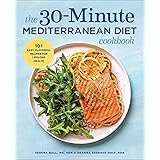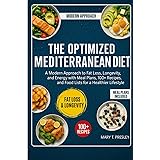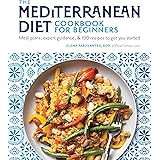The culinary landscape is often a battleground of dietary ideologies, where zealous proponents of veganism clash with fervent advocates of ketogenic eating. Yet, amidst this nutritional maelstrom, one dietary pattern consistently garners widespread approval and critical acclaim: the Mediterranean diet. As highlighted in the accompanying video, this time-honored approach to eating has secured the top spot in U.S. News rankings for an impressive four consecutive years. What, then, is the secret behind the enduring appeal and scientific reverence for the Mediterranean diet?
Far from being a fleeting trend, the Mediterranean diet represents a robust framework for health, drawing its strength from both rigorous scientific validation and generations of lived experience. It’s not merely a list of foods but a lifestyle, a cultural tapestry woven with fresh produce, healthy fats, and communal meals. This comprehensive exploration delves into the foundational pillars that elevate this dietary paradigm, examining its profound benefits, dissecting potential pitfalls, and offering expert insights for its practical adoption.
The Scientific Pedigree of the Mediterranean Diet
When assessing any dietary intervention, the bedrock of scientific evidence is paramount. The Mediterranean diet doesn’t just rest on anecdotal claims; it stands on a formidable foundation of peer-reviewed research. A compelling large-scale clinical trial conducted in France, for instance, revealed startling efficacy: participants adhering to the Mediterranean diet experienced a halving of their overall cardiovascular risk and a remarkable two-thirds reduction in cardiac deaths. Such figures are not merely impressive; they are a testament to the diet’s profound cardioprotective qualities.
Moreover, the scope of its benefits extends beyond cardiovascular health. In a fascinating exploration of its neurological impact, another trial demonstrated that individuals grappling with depression who adopted a Mediterranean eating pattern reported significant improvements in mood and a tangible reduction in depressive symptoms. This suggests a powerful gut-brain axis connection, where nutrient-dense, anti-inflammatory foods can positively influence mental well-being.
Beyond Heart Health: A Spectrum of Benefits
The influence of the Mediterranean diet permeates numerous physiological systems, offering a diverse array of health advantages. Reports consistently link this dietary approach to improved outcomes in diabetes management, where its emphasis on complex carbohydrates, fiber, and healthy fats helps regulate blood sugar levels. Furthermore, studies indicate a role in cancer prevention, likely attributable to the high intake of antioxidants and anti-inflammatory compounds found in its core components. The underlying mechanism is elegant in its simplicity: the diet is rich in foods consistently tied to health benefits—namely, a vibrant spectrum of vegetables, fruits, nuts, beans, whole cereals, fish, and monounsaturated fats like extra virgin olive oil. Conversely, foods strongly associated with health concerns, such as red and processed meats and ultra-processed items, are judiciously minimized.
A Heritage of Health: Historical Validation and Sustainability
Unlike many contemporary diets that emerge from laboratory hypotheses, the Mediterranean diet is rooted in centuries of tradition. The historical adherence of populations in regions like Greece, Italy, and Spain provides a unique, long-term “natural experiment.” Observing the robust health profiles of classical Mediterranean communities offers an added layer of reassurance regarding the diet’s long-term safety and efficacy. While historical data alone cannot definitively isolate the diet’s impact from other lifestyle factors like physical activity or genetics, it complements direct scientific testing, reinforcing the confidence in its health-promoting attributes over generations.
Adherence: The Unsung Hero of Dietary Success
The most scientifically sound diet is futile if individuals cannot sustain it. This is where the Mediterranean diet truly distinguishes itself. Many popular diets, often characterized by strict elimination of entire food groups—be it carbohydrates, fats, or specific proteins—tend to suffer from high attrition rates. People, by nature, struggle with deprivation. They embrace a change with enthusiasm, but, like a ship without an anchor, they eventually drift back to familiar shores and old habits. The Mediterranean diet, however, cleverly avoids this common pitfall. It doesn’t prohibit major food categories; instead, it reorients dietary priorities, encouraging an abundance of certain foods while moderating others.
For most Westerners, this nuanced approach translates into an easier, more palatable transition. The absence of draconian restrictions makes it more “doable,” fostering long-term adherence. As experts often observe, the “best” diet isn’t necessarily the one with the most impressive theoretical benefits, but rather the one an individual will consistently follow. This crucial aspect of sustainability—the fusion of health benefits, long-term safety, and practical doability—is precisely why the Mediterranean diet garners the endorsement of venerable institutions like the American Heart Association, Harvard, and the Mayo Clinic.
Environmental Stewardship and Dietary Flexibility
Beyond individual health, the choices we make at the dinner table reverberate across the planet. The environmental impact of food production is a critical concern, with a growing consensus that “there’s no healthy life on a wrecked planet.” Here, too, the Mediterranean diet offers a compelling advantage.
A Lighter Footprint: Food Choices and Climate Impact
Extensive research underscores the environmental hierarchy of food items. Plant-based foods consistently demonstrate the lowest environmental impacts, serving as a beacon for sustainable eating. Moving up the scale, eggs, dairy, pork, poultry, and responsibly managed fisheries (non-trawling) and aquaculture (non-recirculating) exhibit intermediate impacts. At the apex of environmental burden lie ruminant meats, whose production can have impacts approximately 100 times greater than that of plant-based foods. By intrinsically leaning towards plant-heavy meals and moderating the consumption of meat and dairy, the traditional Mediterranean diet significantly reduces its carbon footprint, aligning personal health with planetary well-being.
The Broad Canvas of Mediterranean Cuisine
The very name “Mediterranean diet” conjures images of sun-drenched coastlines and ancient traditions. Yet, the region itself is a mosaic of cultures—encompassing France, Greece, Italy, and Spain, alongside North Africa and parts of the Middle East. This geographical diversity inherently implies a rich tapestry of dietary variations. There isn’t a single, monolithic Mediterranean diet but rather a spectrum of authentic culinary traditions, each adapted to local ingredients and customs. The eating patterns of sixty years ago in a coastal Greek village might differ significantly from those in a bustling Italian city today.
This inherent flexibility is a powerful asset. It allows for adaptation to individual preferences, cultural backgrounds, and specific health goals. While some contemporary interpretations, like “vegan Mediterranean” or “low-carb Mediterranean,” might stray significantly from the classical template—and certainly, “juice cleanse Mediterranean” might stretch the definition to breaking point—the core principle remains: the diet encourages finding a personalized dietary pattern that prioritizes whole, unprocessed foods, checks the boxes for health, and ideally, aligns with environmental consciousness. This adaptable nature is a significant plus, acknowledging that individual physiological and lifestyle differences dictate diverse nutritional needs, as various studies continually reaffirm.
Navigating the Nuances: Potential Challenges of the Mediterranean Diet
While the merits of the Mediterranean diet are robust, it is essential to approach any dietary pattern with a balanced perspective, acknowledging potential caveats. Just as a meticulously crafted ship can still encounter rough waters, even an exemplary diet has its challenges.
The Double-Edged Sword of Flexibility
The very flexibility celebrated as a strength can, paradoxically, become a weakness if stretched too far. The label “Mediterranean” can be, much like a loosely woven fabric, open to misinterpretation. Frying bacon in olive oil, for instance, might superficially align with an ingredient often lauded in the diet, but it fundamentally contradicts the diet’s core tenets of minimizing processed meats and saturated fats. The true essence lies not in the label, but in the composite dietary pattern: Is it replete with fruits and vegetables? Does it keep added salt, sugar, ultra-processed junk, and saturated fat at bay? If these foundational boxes are unchecked, no quantity of olive oil, however extra virgin, can compensate for an otherwise imbalanced intake. When scientists discuss the Mediterranean diet, they are invariably referring to its classical, traditional iteration, not the modern, Westernized versions often influenced by global fast-food culture.
Caloric Density: A Matter of Mindful Consumption
Another point of consideration, though far from an absolute deal-breaker, pertains to calorie density. Foods intrinsic to the Mediterranean diet, such as olive oil and nuts, are nutrient-dense and exceptionally healthy, yet they are also calorie-rich. This caloric richness means that, without mindful portion control, it is entirely possible to overconsume calories, potentially hindering weight management goals. This is not an indictment of olive oil—indeed, the strongest evidence unequivocally points to its role in reducing cardiovascular risk—but rather a gentle reminder for awareness. Maintaining a healthy body weight or achieving weight loss on a diet that includes healthy oils is entirely feasible; it simply hinges on overall caloric intake and the broader dietary context. Tools like diet trackers such as Cronometer can be invaluable for some, while others might develop an intuitive sense of appropriate portions through experience.
It is also crucial to dispel persistent myths: the notion that oil is inherently unhealthy and causes disease is unsupported by contemporary science. While it is true that oil is not a strict necessity for all, and a no-oil approach is a valid personal choice, propagating scientifically baseless claims about healthy fats like olive oil is counterproductive to public health education.
Cost and Time Commitments
The perceived costs and time investment associated with the Mediterranean diet can, for some, present initial hurdles. Certain staple components, such as fresh fish, a diverse array of nuts and seeds, and high-quality extra virgin olive oil, can indeed command higher prices, depending on sourcing and brand. However, this obstacle is eminently surmountable with strategic planning and smart shopping practices. Frozen vegetables and fish, for instance, often offer a more economical alternative to their fresh counterparts while retaining comparable nutritional value. Bulk purchasing of nuts and seeds—which can be found at surprisingly low prices, such as flax for a little over a dollar a pound, if one knows where to look—can significantly reduce expenses. The key is to recognize that a healthy Mediterranean pattern does not demand expensive ingredients like pecans and cashews; rather, it encourages a reliance on accessible, whole foods, with plenty of cheaper, equally healthy alternatives available to fit any budget and taste preference.
Similarly, the time commitment for preparing fresh meals from scratch can feel daunting to those accustomed to ultra-processed, ready-to-eat options. Yet, this investment in meal preparation is not time lost but rather time purposefully dedicated to one’s health and future well-being. Factoring in the potential time saved later by avoiding illness underscores this long-term dividend. Moreover, efficient organizational strategies, such as batch cooking, can drastically reduce daily prep time, ensuring a consistent supply of healthy, home-cooked meals without constant effort. By integrating these practical approaches, the perceived time burden of embracing a fresh, whole-food diet can be substantially mitigated.











